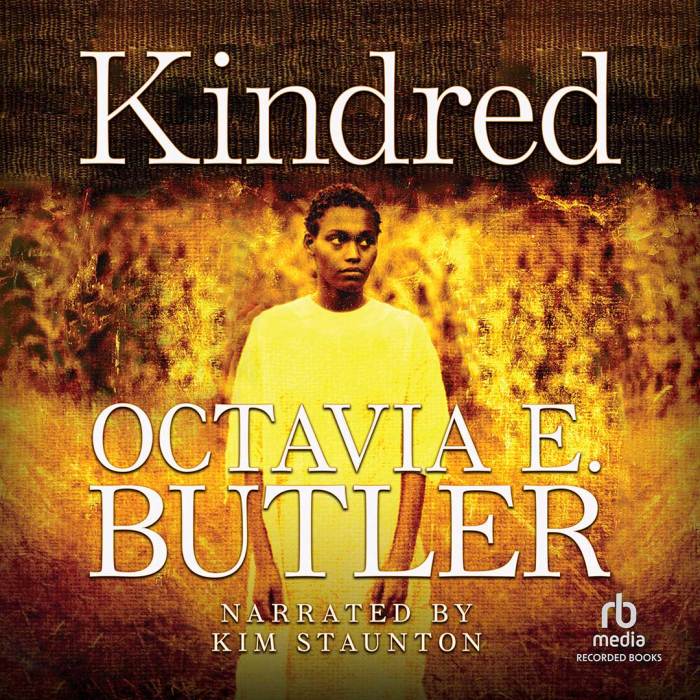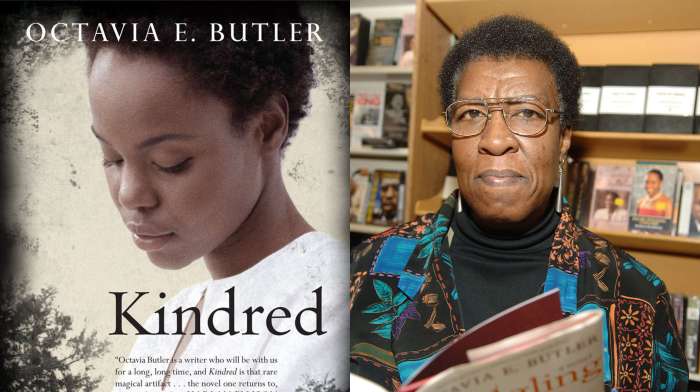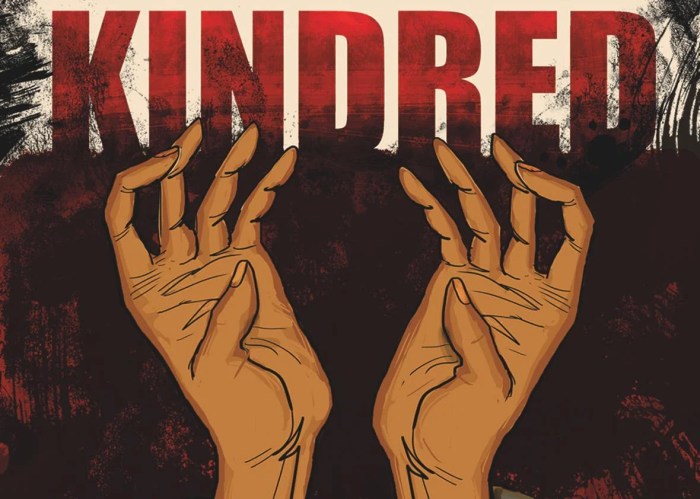Kindred by octavia butler full book – Octavia Butler’s Kindred, a groundbreaking science fiction classic, transports readers on a harrowing journey through time and the complexities of race and gender. This thought-provoking novel explores the enduring legacy of slavery and its profound impact on individuals and society.
Kindred follows the extraordinary experiences of Dana Franklin, a young African American woman who finds herself abruptly transported to a pre-Civil War Maryland plantation. Confronted with the horrors of slavery firsthand, Dana must confront her own prejudices and navigate a treacherous world where her very existence is threatened.
Overview of Kindred by Octavia Butler

Octavia Butler’s Kindred is a groundbreaking work of science fiction and historical fiction that explores the horrors of slavery and the complexities of race and identity.
The novel follows Dana, a young African-American woman from 1970s Los Angeles, who is mysteriously transported back in time to a Maryland plantation in the 1800s. There, she encounters Rufus Weylin, a white slave owner with whom she forms a complex and dangerous relationship.
Setting and Historical Context
Kindred is set in two distinct time periods: 1970s Los Angeles and the antebellum South. Butler’s vivid descriptions of both settings create a powerful contrast between the modern world and the brutal realities of slavery.
The novel also explores the historical context of slavery in the United States, particularly the ways in which white supremacy and racial violence shaped the lives of both enslaved people and their oppressors.
Characters
- Dana: A young African-American woman from 1970s Los Angeles who is transported back in time to a Maryland plantation.
- Rufus Weylin: A white slave owner who becomes Dana’s master. He is a complex and conflicted character, torn between his desire for Dana and his commitment to the institution of slavery.
- Alice: Rufus’s wife, who is jealous of Dana and her relationship with Rufus.
- Kevin: Dana’s husband in 1970s Los Angeles, who becomes increasingly worried about her when she disappears.
Themes and Symbolism in Kindred

Octavia Butler’s Kindred explores profound themes and employs potent symbolism to convey its complex messages about race, gender, and the complexities of time travel.
The novel delves into the pervasive theme of raceand its impact on individuals and society. The juxtaposition of 1970s Los Angeles and the antebellum South starkly illustrates the enduring legacy of slavery and racial oppression.
Symbolism of the Plantation
The Maryland plantation serves as a potent symbol of the oppressive nature of slavery. Its decaying grandeur and the brutal treatment of its inhabitants vividly depict the horrors and dehumanization that characterized this institution.
The plantation represents the power structures and social hierarchies that perpetuate racial inequality. It becomes a microcosm of the larger societal issues that the novel explores.
Symbolism of the River
The river in Kindred symbolizes the fluidity of time and the interconnectedness of the past, present, and future. It serves as a portal between the two eras, allowing Dana to travel back and forth in time.
The river also represents the emotional and psychological journey that Dana undertakes as she grapples with the complexities of her experiences. It is a place of both danger and transformation, where she confronts her own prejudices and learns about the resilience of the human spirit.
Character Analysis of Dana Franklin

Dana Franklin, the protagonist of Octavia Butler’s Kindred, undergoes a profound character arc throughout the novel. Initially, she is a modern, independent woman who is thrust into the antebellum South. Her experiences with slavery profoundly shape her perspective, transforming her into a more compassionate and resilient individual.
Experiences with Slavery
Dana’s firsthand experiences with slavery expose her to the horrors of the institution. She witnesses the brutality of slave owners, the dehumanizing conditions of plantation life, and the psychological toll it takes on slaves. These experiences shatter her previous understanding of race and history, forcing her to confront the complexities of racial oppression.
Relationships with Kevin and Rufus
Dana’s relationships with Kevin and Rufus provide contrasting perspectives on slavery. Kevin, a white slave owner, represents the brutality and oppression of the system. Rufus, a runaway slave, embodies the strength and resilience of the enslaved. Through her interactions with both men, Dana gains a deeper understanding of the complexities of power and resistance within the antebellum South.
Historical Context and Social Commentary

Octavia Butler’s Kindredis deeply rooted in the historical context of American slavery and its enduring legacy. The novel was written during the Civil Rights Movement, a period of intense social and political upheaval in the United States. Butler’s experiences as a Black woman in this era significantly influenced her writing, shaping the novel’s exploration of racism, identity, and the complexities of race relations.
Critique of Racism
Kindredoffers a powerful critique of racism, exposing the insidious and pervasive nature of racial prejudice. Through Dana’s experiences in antebellum Maryland, Butler vividly depicts the horrors of slavery and the dehumanizing treatment of Black people. The novel challenges the myth of racial superiority, highlighting the absurdity and cruelty of racial discrimination.
Butler also explores the psychological impact of racism on both the oppressed and the oppressors. Dana’s encounters with racist characters, such as Tom Weylin and Rufus Weylin, reveal the corrosive effects of prejudice on their own humanity. The novel demonstrates that racism not only harms its victims but also poisons the hearts and minds of those who perpetuate it.
Legacy of Slavery
Kindreddelves into the enduring legacy of slavery, examining its long-term effects on American society. Dana’s journey back in time allows her to witness firsthand the brutality and oppression of slavery, but it also forces her to confront the ways in which slavery continues to shape the present.
The novel highlights the systemic racism that persists in contemporary society, including police brutality, mass incarceration, and economic inequality.
Butler suggests that the legacy of slavery is not merely a historical relic but an ongoing reality that must be actively addressed. Through Dana’s experiences, the novel calls for a deep understanding of the past and a commitment to eradicating racism in all its forms.
Relevance to Contemporary Issues
Kindredremains profoundly relevant to contemporary issues of race and social justice. The novel’s exploration of racism and its enduring legacy resonates with the ongoing struggles for racial equality in the United States and around the world. The novel challenges readers to confront their own biases, to engage in difficult conversations about race, and to work towards a more just and equitable society.
Narrative Structure and Time Travel: Kindred By Octavia Butler Full Book
The narrative structure of Kindredis unique in its use of time travel to explore themes of history, identity, and the interconnectedness of human experiences. The novel is structured as a series of vignettes, each of which depicts a different episode in Dana’s travels back in time.
These episodes are not presented in chronological order, but rather jump back and forth between different periods of time, creating a disorienting and fragmented narrative that reflects the protagonist’s own sense of dislocation and alienation.
The Interconnectedness of Human Experiences
Time travel in Kindredallows Butler to explore the ways in which the past, present, and future are interconnected. Dana’s experiences in the antebellum South force her to confront the horrors of slavery and the racism that continues to shape American society in the present day.
Through her interactions with characters like Rufus and Kevin, she comes to understand the ways in which history repeats itself and the importance of fighting for social justice.
Critical Reception and Legacy
Octavia Butler’s Kindredwas met with critical acclaim upon its publication in 1979. Praised for its groundbreaking exploration of race, slavery, and time travel, the novel quickly established itself as a classic of science fiction and African American literature.
Critics hailed Butler’s skillful use of the time travel device to examine the horrors of slavery and its enduring legacy. The novel’s unflinching portrayal of the brutality and dehumanization experienced by enslaved people resonated deeply with readers, while its exploration of the complexities of race and identity challenged prevailing narratives.
Impact on the Science Fiction Genre, Kindred by octavia butler full book
Kindredhad a profound impact on the science fiction genre, challenging its predominantly white and male-dominated landscape. Butler’s unique perspective as a Black woman writer brought new and essential voices to the genre, expanding its boundaries and pushing the limits of its storytelling potential.
The novel’s exploration of social and historical issues through the lens of science fiction opened up new avenues for storytelling, inspiring a generation of writers to use the genre to address pressing social concerns.
Recognition as a Classic of African American Literature
Kindredis widely recognized as a seminal work of African American literature. Its exploration of the experiences of Black people in America, both past and present, has resonated deeply with readers of all backgrounds.
Butler’s unflinching portrayal of the horrors of slavery and its aftermath challenges traditional narratives and forces readers to confront the systemic racism and inequality that continue to plague American society.
Enduring Relevance and Contemporary Influence
Kindredremains a relevant and influential novel today, continuing to inspire and challenge readers. Its themes of race, identity, and the legacy of slavery resonate with contemporary audiences, sparking important conversations about the ongoing struggle for racial justice.
The novel’s exploration of time travel as a means of understanding the past and present has also inspired contemporary writers, such as N.K. Jemisin and Tomi Adeyemi, who have used the device to explore historical and social issues in their own works.
Clarifying Questions
What is the main theme of Kindred?
Kindred explores the interconnected themes of race, gender, and time travel, examining the enduring legacy of slavery and its impact on individuals and society.
How does Dana’s experience with slavery shape her perspective?
Dana’s firsthand encounter with the horrors of slavery forces her to confront her own prejudices and develop a deeper understanding of the systemic oppression faced by African Americans.
What is the significance of the plantation and the river in the novel?
The plantation represents the oppressive institution of slavery, while the river symbolizes the passage of time and the interconnectedness of past, present, and future.